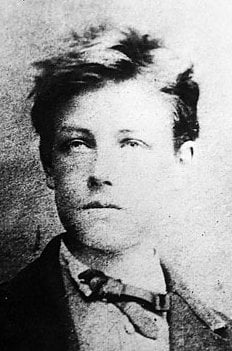|
|
Le dormeur du val
C'est un trou de verdure où chante une rivière, Accrochant follement aux herbes des haillons D'argent ; où le soleil, de la montagne fière, Luit : c'est un petit val qui mousse de rayons. Un soldat jeune, bouche ouverte, tête nue, Et la nuque baignant dans le frais cresson bleu, Dort ; il est étendu dans l'herbe, sous la nue, Pâle dans son lit vert où la lumière pleut. Les pieds dans les glaïeuls, il dort. Souriant comme Sourirait un enfant malade, il fait un somme : Nature, berce-le chaudement : il a froid. Les parfums ne font pas frissonner sa narine ; Il dort dans le soleil, la main sur sa poitrine, Tranquille. Il a deux trous rouges au côté droit.
Arthur Rimbaud, Poésies, 1870
|
The Sleeper of the valley
It is a green hollow where a stream gurgles,
Crazily catching silver rags of itself on the grasses ;
Where the sun shines from the proud mountain :
It is a little valley bubbling over with light.
A young soldier, open-mouthed, bare-headed,
With the nape of his neck bathed in cool blue cresses,
Sleeps; he is stretched out on the grass, under the sky,
Pale on his green bed where the light falls like rain.
His feet in the yellow flags, he lies sleeping. Smiling as
A sick child might smile, he is having a nap :
Cradle him warmly, Nature: he is cold.
No odour makes his nostrils quiver ;
He sleeps in the sun, his hand on his breast
At peace. There are two red holes in his right side.
|
|
Arthur Rimbaud (1854 — 1891) is a French poet. He began to write poetry at the age of 15. When he was 16, he left his family and came to Paris. He both fascinated and shocked the Parisian literary world with his original and innovative work and his dissipated and libertine life. At the age of 21, he totally gave up writing and began to travel a lot : Germany, Italy, Cyprus, Scandinavia. Then he settled in Ethiopia where he died at 37. His work is very famous : it influenced literature, music and art. His most famous pieces are Le Bateau ivre (1871), Une saison en enfer (1873) and Les Illuminations (1874).  border="0" alt="Arthur Rimbaud"> border="0" alt="Arthur Rimbaud">
|
|
|
Arthur Rimbaud write Le Dormeur du val when he’s only 16 years old, in 1870. At this period, France and Germany are involved in a conflict and Rimbaud write this poem to denounce the war and its atrocities. When we read this poem for the first time, we think that it’s only about a young man who’s taking a nap in the beautiful and peaceful countryside. We discover he’s dead at the very end only. And it’s quite shocking. |
|
|
As this text is a poem, it contains a lot of images. Don’t worry if you find it difficult to understand… Today, we’ll just learn together some useful words. Dormeur (masc.) : sleeper. Val (masc.) : valley. Accrocher : to hang. Herbe (fém.) : grass. Argent (masc.) : silver. Fier, fière : proud. Rayon (de soleil) (masc.) : a ray (of sunlight). Soldat (masc.) : soldier. Nuque (fém.) : nape (of the neck). Bercer : to craddle. Parfum (masc.) : perfume, scent, fragrance. Narine (fém.) : nostril. Poitrine (fém.) : chest, breast. |
|
|
Just notice in this poem the three present participles :
accrochant, baignant and souriant.
The first two participles can be replaced with a relative clause :
qui accroche and qui baigne.
The last one is almost a gerund even if we don’t have the preposition en.
Souriant comme sourirait un enfant malade
|

